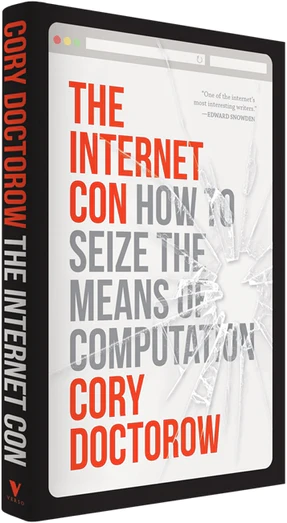First of all, Doctorow deals with how Big Tech took control of the internet. He argues that Lovelace, Turing, and others pioneered the internet. In other words, Amazon could not exist without its predecessors.
Some people argue that these Big Tech geniuses like Zuckerberg or Gates created their companies and therefore deserve to be mega-rich and monopolists. However, Doctorow shows that what has happened in the internet industry has also happened in pharmaceuticals, health insurance, defence contractors, the airline industry, appliances, and many other industries, where between 1 and 5 companies have complete control.

This is a relatively recent event. So unless there was an incredible short period when only geniuses thrived, there must be another reason. Doctorow goes back to the anti-trust laws of the 19th and 20th centuries. In the US, laws were introduced to stop “harmful dominance” and monopolisation.
Judge Bork led the antitrust laws’ opponents during the Reagan era. With big finance, he ran seminars and schools for judges, where 40% of all US judges attended. Bork was backed by the Chicago School of monetarist economists and reversed the legal situation in the US to the point where monopolies were considered good. Nearly all judgements went that way, unless they could be proven harmful, which was very difficult. As Trump backer and NHS outsourcing investor Peter Thiel said, “Competition is for losers.”
When we come to the internet, Doctorow deals with how some firms like Amazon, Apple, Facebook, and others have come to dominate. The key issue for him is ‘interoperability’. This means that Facebook, Apple, and others would not let other systems or software connect with theirs.
Tech companies have created virtual prisons. For example, people would build up their circle of friends and contacts on one application but then couldn’t transfer them elsewhere. So people were free to leave, but they needed to get all their friends to leave too. The tech companies could treat you badly, but you were trapped by the network you’d built on their platform. They would also trap you with poorly designed products.
Giving technology companies the power to monitor internet content also gives them the ability to suppress certain voices. Calls to have tech CEOs police the internet could backfire, as monitoring powers could be misused to silence marginalised groups. We should think carefully before demanding oversight from private companies over what is allowed online.
Maintaining control over technology and data is the top priority for major tech companies. They initially created code to prevent copying without permission. As hobbyists cracked this code, the companies kept strengthening it to stay ahead, eventually lobbying for laws making it illegal to circumvent protective codes.
Big tech is not just trapping consumers; it is also trapping smaller software companies. For example, software developers must agree to sacrifice huge profits to Apple to have apps on iPhones. Unlike PCs, Apple does not allow copies of their machines.
With security, Apple, Facebook, and others have full control of your life, knowing everything you do. They can sell this and allow state actors access. The Chinese state has been given backdoors into Chinese-made systems.
Doctorow argues these companies maintain dominance and grow through switching costs, i.e., the hassle of you and your network changing platforms. Their market value is you; it’s you they sell. With all the money they now have, they can further dominate by buying any successful startup. Why keep innovating when you can purchase the competition?
In all major industries, the standard committees that rule on aspects of the standard are dominated by ‘volunteers’ from the big companies—the poacher turned gamekeeper.
Much of this book becomes relevant in AI discussions. The media often leaves out who will control AI—will it be Big Tech? Google has already acquired the successful British AI company, DeepMind. Despite talk of AI’s dangers and advantages, Big Tech will likely decide the path.
Doctorow praises some EU attempts to control Big Tech dominance and even some US moves, but as a non-tech person, I found some technicalities hard to grasp. Overall, this is a worthwhile read, as we need to find an answer to defeating Big Tech’s dominance.
The Internet Con: How to Seize the Means of Computation by Cory Doctorow
Published by Verso Books
Art (54) Book Review (127) Books (114) Capitalism (68) China (81) Climate Emergency (99) Conservative Government (90) Conservative Party (45) COVID-19 (46) EcoSocialism (60) Elections (83) Europe (46) Fascism (62) Film (48) Film Review (68) France (72) Gaza (62) Imperialism (101) Israel (129) Italy (46) Keir Starmer (56) Labour Party (113) Long Read (42) Marxism (49) Marxist Theory (47) Palestine (181) pandemic (78) Protest (153) Russia (343) Solidarity (150) Statement (50) Trade Unionism (144) Ukraine (351) United States of America (139) War (370)

